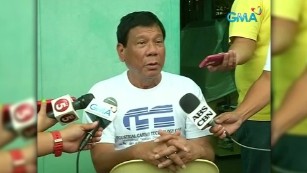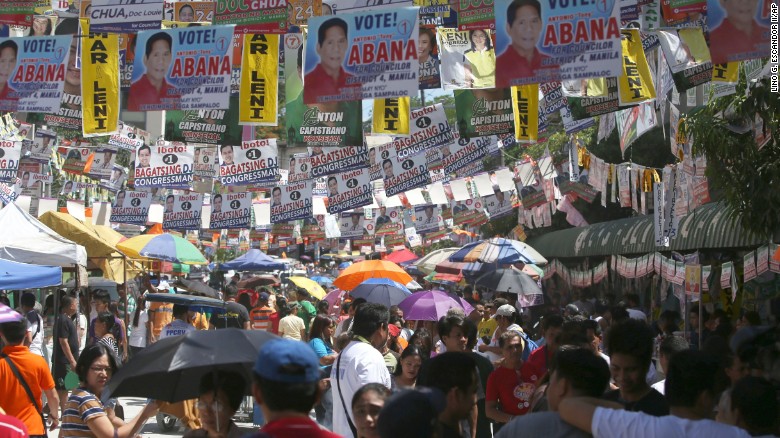'Duterte Harry' tipped to win as Philippines heads to the polls
Millions of voters in the Philippines braved stifling hot weather to line up and have their say in the national election as polls opened Monday.
Nearly 55 million of the country's 100 million population have registered to choose not only a new president and deputy, but also to elect half of the Senate, the entire House of Representatives as well as tens of thousands of local posts, from governors, mayor and members of the provincial councils.
Although there were long lines at some polling stations -- voter counting machine paper jams were responsible for some of the backup -- generally voters said election staff and volunteers seem to be more informative and organized than in previous years.
Many took to social media to post photos of their ink-stained finger to show they had done their civic duty.
Among the first to have voted was presidential candidate and current vice president Jejomar Binay. He arrived at 6 a.m. at the San Antonio National High School polling center in Manila, first stopping to take photos and shake a few hands.
On the curbside near the polling precinct vendors were hawking cold drinks and snacks to the hundred or so voters already milling about.
"I hope that we will have clean elections. My concern is massive cheating," Binay said.
Binay was a close friend of former president Corazon Aquino, who has played a large role in backing Binay's political career. But a falling out with Aquino's son, current president Benigno Aquino III, led to the younger Aquino endorsing another presidential candidate, Mar Roxas.
Binay said he was confident of winning. "I prepared my victory speech ... because I think -- like what you've seen during the campaign, I will really win," he said.
'Duterte Harry?'
Despite Binay's outward confidence, it is Rodrigo Duterte, long-time mayor of the southern city of Davao, who is leading in presidential polls.
Duterte faces current Interior Minister Mar Roxas, Aquino's protege who is perceived as bland despite his solid credentials; Grace Poe, 47, a popular senatorwho has been challenged over her citizenship; Jejomar Binay, 73, the country's exiting vice president hounded by accusations of corruption; and Miriam Defensor Santiago, 70, a veteran lawmaker and legal expert who once contested the presidency in 1992.
A recent poll by polling firm Social Weather Stations has Duterte in the lead, with 33%, followed by Poe at 22% and Roxas at 20%. Binay and Santiago were at 13% and 2%, respectively.
Dubbed "Duterte Harry" and "The Punisher" by the enamored local press for his exploits, he is a colorful and controversial figure known for his inflammatory comments on a gang rape, his sexual conquests and tough stance on crime.
In the southern city of Davao, where Duterte has held office for decades, he has long been dogged by allegations of ties to death squads and extrajudicial killings.
If elected, he has vowed to execute 100,000 criminals and dump them into Manila Bay.
In his last campaign stump Saturday, Duterte played his role to the hilt, and again vowed to butcher criminals as he told thousands gathered in central Manila: "Forget the laws of human rights."

Candidate under fire for rape 'joke'
"If I make it to the presidential palace, I will do just what I did as mayor. You drug pushers, hold-up men and do-nothings, you better go out. Because as the mayor, I'd kill you," Duterte, said to wild cheers from the throng of supporters.
Duterte: From 'Punisher' to President?
He has also promised to jail the corrupt, along with rogue members of the police and the military.
His tirades against the country's elite have touched a chord among many Filipinos but he has set alarm bells ringing for rights advocates.
'Specter of dictatorship?'
President Benigno Aquino III, the son of the country's democracy icons Benigno Jr. and Corazon Aquino, was elected in a landslide in 2010, but his popularity has taken a dent in the past two years as crime worsened — even as the economy chugged forward.
Aquino himself called for all the candidates to unite against Duterte, warning of uncertainty and the "specter of dictatorship" if Duterte won.
Roxas, 57, said the campaign had been extremely taxing and characterized by mudslinging. He said the Philippines once again was in the world's spotlight, and urged all voters to make the right choice.
"We are here fighting for our future, fighting for the continuation of our way of life," he said Saturday. "No matter what they say, critics cannot deny that the Philippines is now Asia's bright star."
Indeed, the Philippine economy has steadily grown since the early 2000s, earning credit ratings upgrades, with the economy and spending power fueled by the money sent home by the country's army of overseas workers.
On the political and diplomatic front, the government has been feted for standing up to China over a row in the South China Sea.
Protest vote?
Ramon Casiple, a political analyst and head of the Institute for Political and Electoral Reform, said Duterte is "a protest vote."
"He is a symbol for the people. Nothing happened for many people in the past six years, and he has capitalized on his image as the folk hero here," Casiple told CNN.
He said the electorate were mesmerized at how Duterte continued his attacks on the country's elite, and seemed to care little that he is portrayed, at times, as uncouth.
"Even some in the business elite are intrigued by what he has promised, and the way he proposed to step down as president if he failed to solve crime, traffic, congestion," he said, but cautioned as well that when "moths fly closely into the fire" oftentimes, they get burned.
News Courtesy: www.cnn.com











